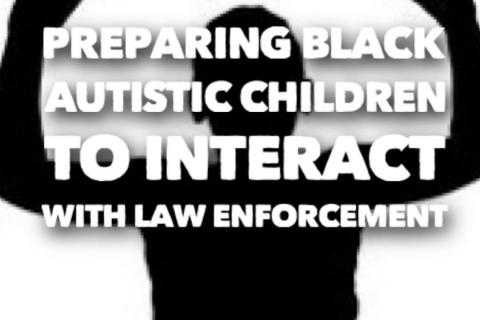
~ 2 minute read
Trigger Warning: Police; Murder
1 in 5 teens with autism will be stopped and questioned by police by the age of 21. Autistic adults are five times more likely to be jailed than their neurotypical peers! Black men and boys are almost 3 times more likely than white men and boys to be killed by police. Black girls and women are almost 2 times more likely than while women and girls to be killed by police. Consequently, if you have a black and autistic child, you must prepare them for interactions with law enforcement within their social skills repertoire. Here are some tips:
Plan and practice disclosure / safety techniques
Plan and practice disclosure / safety techniques, including but not limited to the following:
- When to anticipate law enforcement interactions.
- Develop and practice an individual-specific vocal disclosure plan.
- Teach them to always keep their hands visible and to drop any objects in their hands.
- Practice when and how to obtain permission or signal your intentions before reaching into their pockets, bag or glove compartments of vehicles.
- Practice when and how to direct police on where their ID and /or handout card is located (for safety reasons this is preferred over reaching into their own pockets unless they are directed to do so or are tactile defensive)
- Develop and practice how to use a handout card that discloses their diagnosis, triggers (i.e. tactile aversions), and behaviors (ie stimming). *If your child is non-vocal or vocal but subject to selective mutism this is essential.
- Practice when and how to request to call an advocacy organization or personal advocate, relative or friend (directions with contact information should be on the handout card).
- Develop and practice self-calming and coping strategies.
- If they don’t understand their Miranda rights, practice responding, “No, I do not understand.”(This should also be included on the handout card).
- Prepare them with the knowledge that they may be touched and equip them with coping strategies (i.e. calming self-talk, breathing techniques) to utilize if this occurs.
- Teach them not to run.
- Teach them to not touch a police officer’s dog.
- Teach them to not touch a police officer’s weapon or person.
Unfortunately, I realize there will be law enforcement encounters that still result in tragic circumstances even when we prepare our children. However, preparing your child may not only prevent tragedy from occurring but also help them to cope with their own anxieties during such a stressful situation and establish undoubted proof of misconduct on law enforcement’s behalf should it occur.
We absolutely should NOT have to prepare to defend our own maltreatment but this is our reality. This is not intended to promote living in fear! Do not teach fear, but the notion of preparedness while living in America as it currently stands.
About Joy F. Johnson, M.Ed, M.S.
Joy is a Behavior Specialist, Inclusion Specialist, and Autism Advocate who partners with organizations, individuals, and families to improve the lives of those impacted by autism. After spending years working in clinical settings, non-profits, and schools, her experience enables her to truly serve and represent autism community members in various contexts. She holds a Master’s Degree in education, a Master’s in psychology with a specialization in ABA, and is currently a PhD candidate.
In addition to her extensive education professional experiences, she has a great deal personal experience. She is diagnosed with autism herself, which provides her with unique perspectives, knowledge, and source of passion.
Visit her website at https://joyfjohnson.com/ and her Instagram at https://www.instagram.com/joyfjohnson/
DISCLAIMER: This document reflects the views of the author. It is Autism Ontario’s intent to inform and educate. Every situation is unique and while we hope this information is useful, it should be used in the context of broader considerations for each person. Please contact Autism Ontario at info@autismontario.com or 416-246-9592 for permission to reproduce this material for any purpose other than personal use. © 2020 Autism Ontario 416.246.9592 www.autismontario.com
